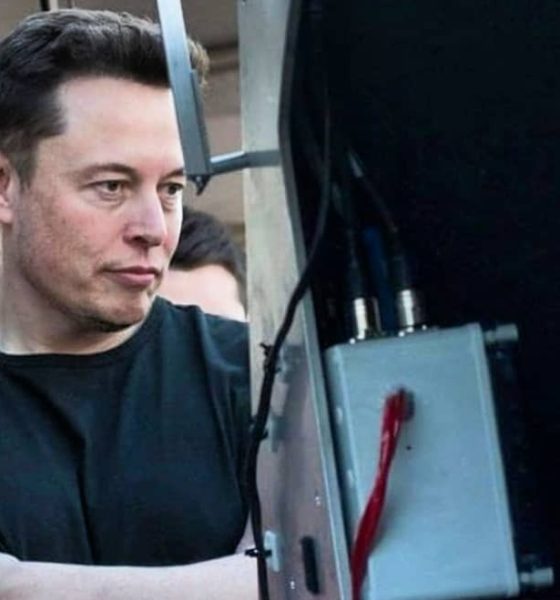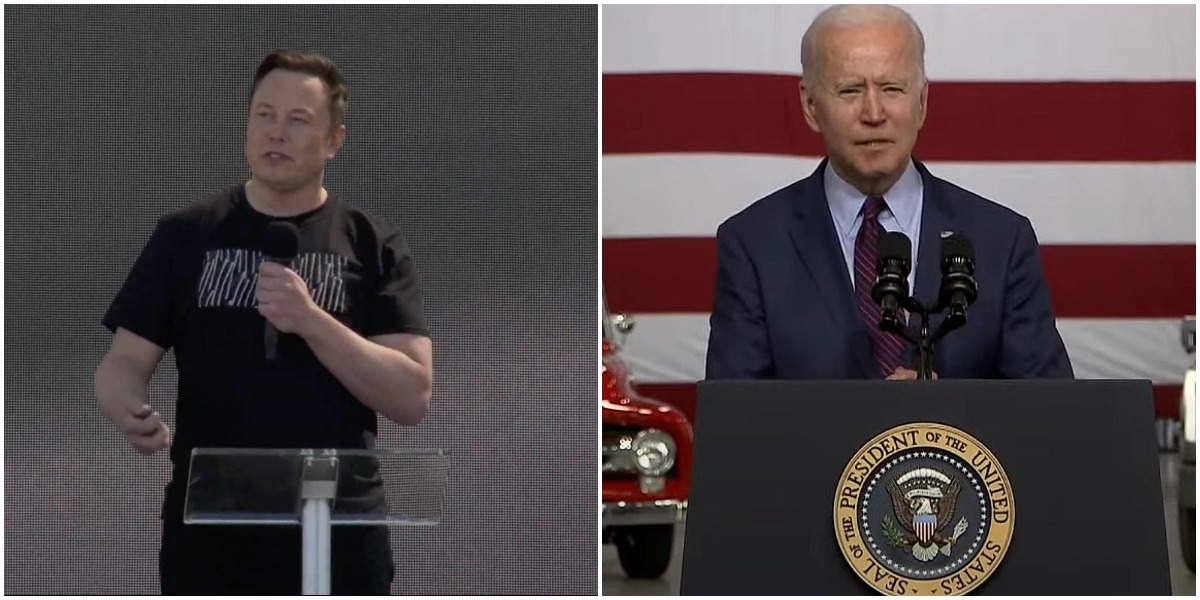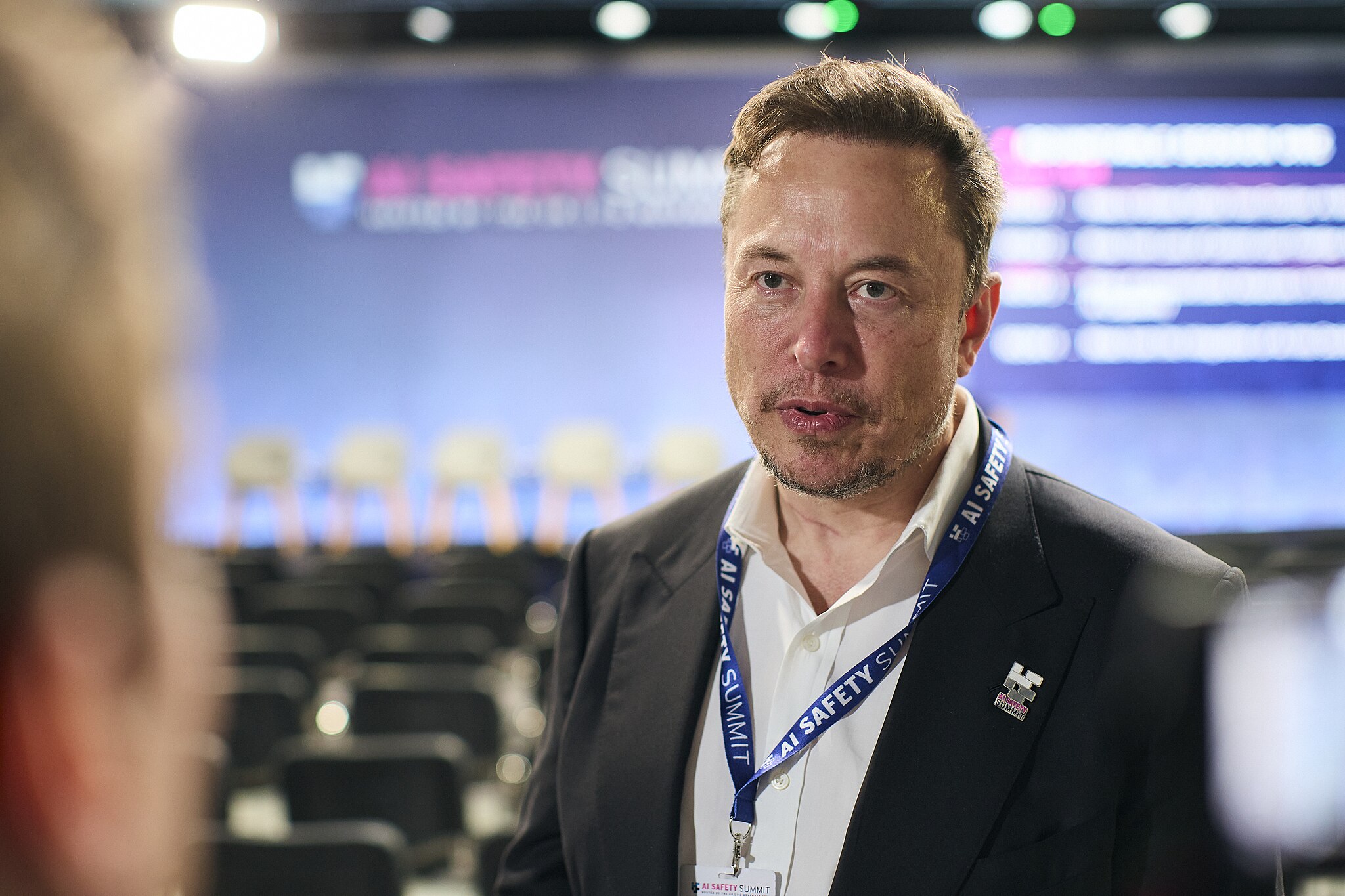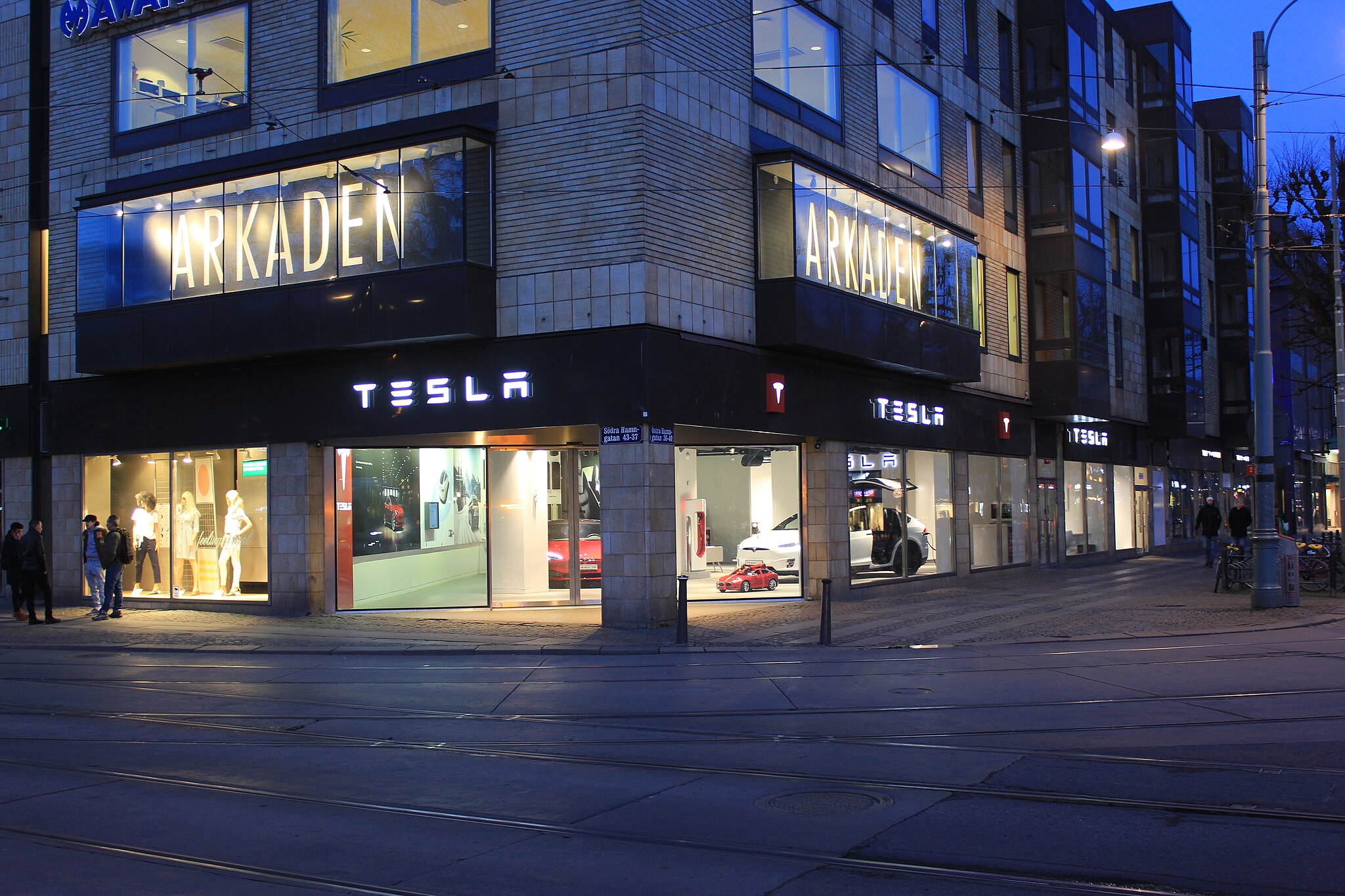

News
OPINION: Musk’s distaste for Biden incentives would even EV playing field
Tesla CEO Elon Musk had an idea during an interview last evening with the Wall Street Journal: Get rid of government incentives for everyone, including electric vehicles, gas, and oil subsidies. The idea, while it would eliminate potentially $12,500 from an EV’s price tag (if it’s built in a Union facility in the United States with a U.S.-produced battery, and it’s a Chevrolet Bolt), might be the best way for consumers to choose what vehicle would be best for them, and it might be the most ideal way for political interests to subside from the bigger picture: transitioning away from combustion engine vehicles.
It is no secret that Tesla fans have felt slighted by President Joe Biden and other members of his administration. Despite dominating the U.S. EV market share and, without much evidence to suggest otherwise, being the reason so many car companies are deciding to dive into electrification, Tesla is not a word that has been uttered from the President’s mouth. However, other companies, like Ford, General Motors, and others, who are working to transition to EVs, are getting the attention.
In the big picture of the mission, it is great that car companies are continuing to work toward complete electrification, but is it fair for the EV leader and the real reason these legacy companies have to transition or else be left behind cannot get any positive support from the U.S. Presidential Administration?
Elon Musk thinks President Joe Biden’s EV incentives should be a thing of the past.
All of these points bring up perhaps the biggest and most bold statement Musk has made regarding the EV incentives: Get rid of them.
Despite the attractive EV rebate that could put thousands in a consumer’s pocket, especially with the potential for a “refundable” credit based on language in the Build Back Better plan, Musk says that the incentives should not even exist. “Tesla’s made roughly two-thirds of all the electric cars made in the United States. I’m not sure if most people are aware of that. So Tesla’s made roughly twice as many electric vehicles as everyone else has made. Honestly, I would just can this whole bill. Don’t pass it. That’s my recommendation.”
Perhaps this is the right move, simply because it would take politics out of the entire EV sector. At a point where environmental sustainability needs to be one of the focuses of consumerism moving forward, there is no reason for politics or inside interests to disrupt the outright potential of the sector or any of its participants. Not to mention, the obvious ousting of Tesla, Rivian, and other EV makers by the Biden Administration does not necessarily put some consumer minds in the right space. If Biden and others truly cared about transitioning the automotive industry to EVs, would they ignore the largest contributor to the transition? Likely not.
Eliminating incentives from the EV sector would cancel any political influence a consumer may have to digest before purchasing a car. Instead, let the consumer buy what they want, for the price they can afford, at a time when they can afford it. Incentives would likely push the Bolt to sell more units than ever before, especially considering it offers the largest rebate and the vehicle is available for under $30,000 before incentives anyway. It would be a great move to increase the number of EVs on the road, but it would also be unfair to other carmakers, especially the ones who have put more focus on EVs and are pot-committed to transitioning to EVs.
Musk’s idea to rid the system of incentives may be one of the best yet. If people want an electric vehicle, they are going to buy one. Lack of incentives have never stopped consumers from buying $70,000 pickup trucks, a $100,000 Mercedes-Benz, or a $129,000 Model S Plaid. Many people are going to buy the car they want, regardless of what the government might give back in a tax credit. If one thing is for certain, EV tax credits have been proven to be more of a political interest than a consumer advantage.
Musk’s full interview with the Wall Street Journal is available below:
I’d love to hear from you! If you have any comments, concerns, or questions, please email me at joey@teslarati.com. You can also reach me on Twitter @KlenderJoey, or if you have news tips, you can email us at tips@teslarati.com.

Elon Musk
Elon Musk’s Grokipedia is getting cited by OpenAI’s ChatGPT
Some responses generated by OpenAI’s ChatGPT have recently referenced information from Grokipedia.

Some responses generated by OpenAI’s ChatGPT have recently referenced information from Grokipedia, an AI-generated encyclopedia developed by rival xAI, which was founded by Elon Musk. The citations appeared across a limited set of queries.
Reports about the matter were initially reported by The Guardian.
Grokipedia references in ChatGPT
Grokipedia launched in October as part of xAI’s effort to build an alternative to Wikipedia, which has become less centrist over the years. Unlike Wikipedia, which is moderated and edited by humans, Grokipedia is purely AI-powered, allowing it to approach topics with as little bias as possible, at least in theory. This model has also allowed Grokipedia to grow its article base quickly, with recent reports indicating that it has created over 6 million articles, more than 80% of English Wikipedia.
The Guardian reported that ChatGPT cited Grokipedia nine times across responses to more than a dozen user questions during its tests. As per the publication, the Grokipedia citations did not appear when ChatGPT was asked about high-profile or widely documented topics. Instead, Grokipedia was referenced in responses to more obscure historical or biographical claims. The pattern suggested selective use rather than broad reliance on the source, at least for now.
Broader Grokipedia use
The Guardian also noted that Grokipedia citations were not exclusive to ChatGPT. Anthropic’s AI assistant Claude reportedly showed similar references to Grokipedia in some responses, highlighting a broader issue around how large language models identify and weigh publicly available information.
In a statement to The Guardian, an OpenAI spokesperson stated that ChatGPT “aims to draw from a broad range of publicly available sources and viewpoints.” “We apply safety filters to reduce the risk of surfacing links associated with high-severity harms, and ChatGPT clearly shows which sources informed a response through citations,” the spokesperson stated.
Anthropic, for its part, did not respond to a request for comment on the matter. As for xAI, the artificial intelligence startup simply responded with a short comment that stated, “Legacy media lies.”
News
Tesla Europe builds momentum with expanding FSD demos and regional launches
Needless to say, it appears that Tesla is putting in some serious effort into boosting sales in Europe this year.

Tesla has been notably active across Europe in recent weeks, expanding its Full Self-Driving (Supervised) ride-along program, entering a new market, and showcasing its newest vehicles across multiple regions.
Needless to say, it appears that Tesla is putting in some serious effort into boosting sales in Europe this year.
Tesla Europe recently announced the expansion of its FSD (Supervised) ride-along experiences, inviting the public to experience the system on local roads. Initially available in Italy, France, and Germany when it launched, the program has now expanded to Hungary, Finland, and Spain.
The ride-along program allows participants to ride in the passenger seat and observe how FSD Supervised handles real-world traffic scenarios, including dense urban driving and other challenging conditions. Tesla has positioned the initiative as a way to familiarize European drivers and regulators with the system’s capabilities in everyday use. The program has received positive reviews so far, with many being impressed by FSD’s real-world capabilities.
Tesla also recently launched operations in Slovakia with a pop-up store and multi-day public event in Bratislava, as noted in an EV Wire report. The launch, held from January 16 to 18 at the Eurovea Mall Promenade, featured test drives, vehicle displays, including the Cybertruck, as well as family-focused attractions such as a mini-Tesla racetrack.
Local observers noted that Tesla Optimus was also shown at the event, while the Tesla Owners Slovakia club welcomed the brand with a coordinated light show near the Slovak National Theater. Tesla Europe later shared its appreciation for Slovakia in a post on its official social media account on X, stating, “Thanks, Slovakia, for the amazing last 3 days & for giving us such a warm welcome!”
Tesla’s Slovakia entry follows a familiar pattern used by the company in other European markets. Tesla opened a pop-up store in Bratislava as an initial step, with plans for a permanent showroom and a potential service center at a renovated site previously occupied by a Jeep and Dodge dealership. Tesla has used a similar approach in markets such as Czechia and Lithuania, where permanent facilities followed within a few months of pop-up launches.
Slovakia already has six Supercharging sites totaling 46 Superchargers, including two locations in Bratislava, providing early infrastructure support for Tesla owners. Tesla staff program manager Supratik Saha described the Slovakia launch as a strategic expansion in the heart of the EU, citing the country’s strong automotive manufacturing base and appetite for advanced technology.
Beyond the EU, the company also marked another milestone with the first Cybertruck deliveries in the United Arab Emirates, signaling continued geographic expansion for Tesla’s newest vehicle. Just like Tesla Slovakia, the Cybertruck also received a warm welcome from the UAE’s EV community.
News
Tesla Sweden maintains Trelleborg port deal despite union blockade
As noted in a report from Dagens Arbete (DA), Tesla was able to maintain its storage agreement with the Port of Trelleborg.

Tesla Sweden is still storing vehicles at the Port of Trelleborg despite the ongoing blockades against the company from the country’s labor unions.
Tesla still at Port of Trelleborg
As noted in a report from Dagens Arbete (DA), Tesla was able to maintain its storage agreement with the Port of Trelleborg. This allows the company to keep vehicles at the port while imports into Sweden continue. This was despite the Transport Workers’ Union’s blockade, which was aimed at halting the loading and unloading of Tesla vehicles in the area.
Local union leader Jörgen Wärja, chairman of Transport and an employee representative on the port company’s board, confirmed that the agreement was still active. “The agreement has not been terminated. You want to have the money instead of having empty warehouses. I understand the reason, but I do not support it,” Wärja said
The local union leader also noted that he visited Tesla’s storage area earlier this week. “There were a lot of cars. I was surprised that there were so many, actually,” he said.
Tesla had been able to bring vehicles into Sweden via passenger ferries at Trelleborg, a method that unions said allowed the company to bypass the blockade, DA noted. According to estimates from IF Metall, the workaround enabled Tesla to deliver thousands of cars to Sweden each year.
Port defends decision
The Port of Trelleborg did not issue a comment on its current agreement with Tesla, but said it had complied with union sympathy measures. Documents reviewed by Swedish media showed that the contract with Tesla was being extended in six-month intervals.
Port CEO Malin Collin noted that the port would not discuss individual customer arrangements. “We do not go into details regarding any customer agreements. We have continuous dialogue with potential tenants, and this is not unique to any location,” Collin wrote in an email.
The CEO added that the port was following legal requirements related to the labor dispute. “We have taken note of the Transport Workers’ Union’s decision on sympathy measures and are of course following applicable legislation and the requirements placed on us as employers,” Collin said.
Jörgen Wärja, for his part, stated that the issue was not whether Tesla’s imports into Sweden could be fully stopped, but whether the port should provide logistical support to the electric vehicle maker during an active conflict. “The port shouldn’t have anything to do with Tesla at all, we believe,” he said. “It’s purely moral. Whether you honor a conflict or not. If you say you support Transport’s sympathetic actions against Tesla, it becomes a double standard.”









